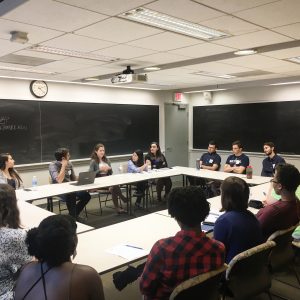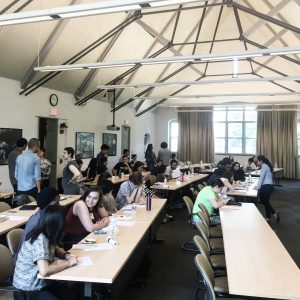Words cannot begin to express my excitement today! Despite some technical difficulties while working on our portfolio websites, this has been an amazing week!
We began with a quick refresher of HTML and CSS using a few tutorials hosted by the one and only CodeAcademy. After this the real work lay ahead. On Monday afternoon we had the opportunity to meet up with Christina Dobrzynski (College Archivist) and Evan McGonagill (Project Manager for College Women) to discuss how the College Women collection c ame about. It wasn’t until 1977 that the Bryn Mawr college archives were created. While the original records included in the archive were originally administratively oriented, as time transpired Special Collections was placed in charge of both interpreting and cataloging archival material ranging from photographs to diaries. As part of this arduous process of digitizing, cataloging, and interpreting the Bryn Mawr archives, the idea of the College Women collection was born. Currently in its pilot phase, College Women is a consortial project supported by the libraries and archives of the traditionally all-female collegiate institutions commonly known as the Seven Sisters. The project began in the spring of 2014 with a Foundations Grant from the National Endowment for the Humanities to support the development of an online portal capable of searching the institutions’ digital collections of student material. The Digital Scholarship Summer Fellows will be contributing to this project by creating an accessible digital project. We were able to discuss with Evan what our own role will be within the College Women project and how we will need to find a way to make valuable connections with the archival materials.
ame about. It wasn’t until 1977 that the Bryn Mawr college archives were created. While the original records included in the archive were originally administratively oriented, as time transpired Special Collections was placed in charge of both interpreting and cataloging archival material ranging from photographs to diaries. As part of this arduous process of digitizing, cataloging, and interpreting the Bryn Mawr archives, the idea of the College Women collection was born. Currently in its pilot phase, College Women is a consortial project supported by the libraries and archives of the traditionally all-female collegiate institutions commonly known as the Seven Sisters. The project began in the spring of 2014 with a Foundations Grant from the National Endowment for the Humanities to support the development of an online portal capable of searching the institutions’ digital collections of student material. The Digital Scholarship Summer Fellows will be contributing to this project by creating an accessible digital project. We were able to discuss with Evan what our own role will be within the College Women project and how we will need to find a way to make valuable connections with the archival materials.
Tuesday was very busy as we spent it mostly editing and perfecting our portfolio websites; a very challenging, but rewarding task. By the end of day, we accomplished our goal and our websites went live. On Wednesday we had the opportunity to learn from Alicia Peaker and our guest speaker George Williams (Associate Professor, University of South Carolina-Upstate) about web accessibility. I had never considered the great lengths that web-developers must go to in order to truly make websites accessible for people with disabilities. As George emphasized, web accessibility needs to be at the forefront–from designing meaningful web-links to providing alternative text for digital images and assuring that navigation is simple and predictable. Not only did we learn about the importance of making our own websites accessible, but we were also introduced to Mac’s built-in VoiceOver tool that is used to assist people with disabilities in navigating websites. Following a discussion of the ethics of technology, the DSSF cohort and I made it our task to double-check the accessibility of our own websites using webaim.

DSSF couldn’t have chosen a better way to conclude our week as we held the Digital Scholarship Summer Meetup with fellows and interns from colleges such as Haverford, Swarthmore, Lafayette, UPenn, and Bucknell. The day was amazing and we were able to learn about the research and projects of other students. My conversations with a variety of individuals (about what motivated them to pursue digital scholarship and how they managed to find a way to use it to their advantage in relation to their projects) left me feeling very inspired at the end of the day. Some of the projects which I learned about dealt with stratification in Colombia, depicting disability in reality love TV, and Sami indigeneity in Sweden. Until next week!